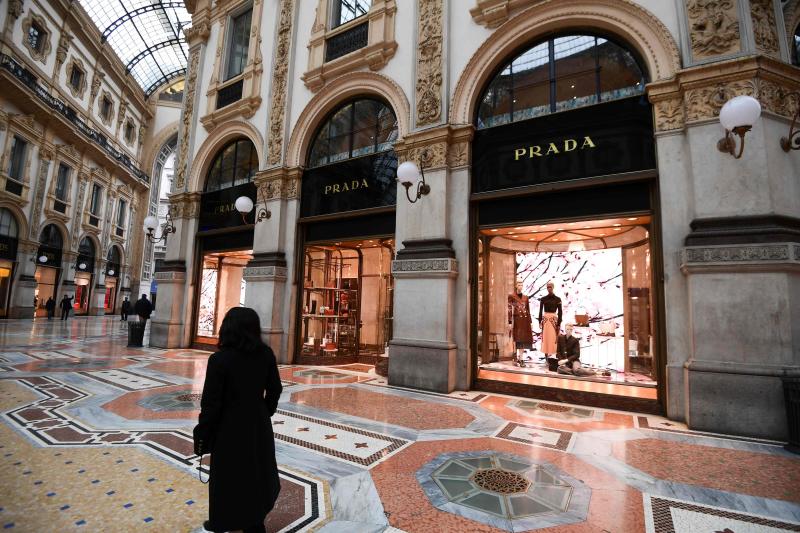Europe braces for spreading economic impact of coronavirus
Sign up now: Get ST's newsletters delivered to your inbox

A woman walks by a store of luxury brand Prada in Galleria Vittorio Emanuele II on Feb 29, 2020 in central Milan, northern Italy.
PHOTO: AFP
Follow topic:
BERLIN (BLOOMBERG, AFP) - Europe braced for more fiscal fallout from the coronavirus on Sunday (March 1), with hard-hit Italy planning to spend money to prop up its already weak economy and German car-makers warning of a dip in demand.
The Italian government aims to spend 3.6 billion euros (S$5.5 billion) to help weather the crisis, including measures to cushion the economic impact on northern Italy, the focus of the country's outbreak, Finance Minister Roberto Gualtieri told La Repubblica newspaper.
"By next Friday, we will adopt (measures) to support the economy for all the sectors affected across the country," he said. "I have no reason to fear Brussels contesting our request."
Every European Union member state must keep within strict budget rules and limit deficit spending to set amounts or face sanctions and fines from Brussels.
Mr Gualtieri said the aid could take various forms and include tax credits for businesses. He also announced that the 19 eurozone finance ministers will discuss a possible joint action plan at their meeting on March 16.
With more than 1,000 confirmed cases reported, Italy is the epicentre of coronavirus in Europe, with the third-most infections in the world behind China and South Korea.
European authorities have cancelled some of the continent's biggest business events, including the ITB tourism trade fair and Geneva Motor Show, banned large gatherings and tightened border controls in an effort to limit the virus's spread.
The crackdown will have an impact far beyond Italy, other European governments warned.
"A correction of the economic forecast can be expected," Mr Eric Scheidegger, head of the economic policy directorate at Switzerland's State Secretariat for Economic Affairs, told reporters on Saturday. The scope of the impact isn't yet clear, he said.
The virus's arrival in Italy, where the first death was reported on Feb 21, coincided with high-profile international events such as Fashion Week as well as the peak of the winter vacation season. Families from across Europe flew through Venice and Milan to Italian ski resorts, and many of the cases being reported in other European countries now are linked to visits to Italy.
The first cases emerged on Saturday in the German banking centre of Frankfurt. Three men were infected, with two of the cases traced to other infected Germans and a third linked to a trip to Italy.
Germany can't rule out sealing off entire regions or cities, Interior Minister Horst Seehofer told Bild am Sonntag newspaper in an interview. "This scenario would be the last resort," he said.
Globally, more than than 87,000 people have been infected with the virus, more than 1,500 of them in Europe, the European Centre for Disease Prevention and Control said on Sunday.
The window to contain the outbreak is narrowing, the World Health Organisation warned.
Shortly before the first coronavirus death in the United States was reported on Saturday, the Centres for Disease Control and Prevention recommended against traveling to Italy.
In the United Kingdom, authorities are prepared to quarantine entire cities if need be, Health Secretary Matt Hancock said in a BBC interview.
"There's clearly a huge economic and social downside to that, but we don't take anything off the table at this stage," Mr Hancock said.
American Airlines Group is suspending flights to and from Milan until April 25 due to a reduction in demand, the carrier said in a statement late Saturday. The suspension affects what had been one daily flight each between the Italian city and both New York and Miami.
The German automotive industry cut its expectations on both demand and exports last month, according to an Ifo Institute survey. Car-makers foresaw cuts on personnel planning in particular, the survey showed.
In France and Switzerland, meanwhile, authorities called for a stop to the traditional practice of greeting friends with a kiss - or in the case of the Swiss, three kisses - on the cheek.
"The reduction in social contacts of a physical nature is advised," Health Minister Olivier Veran said at a news briefing on Saturday.

